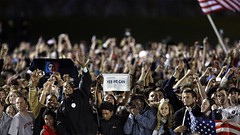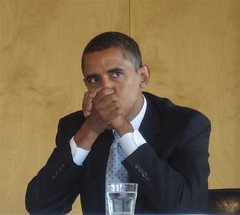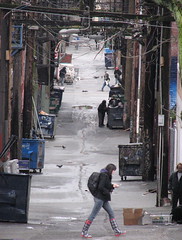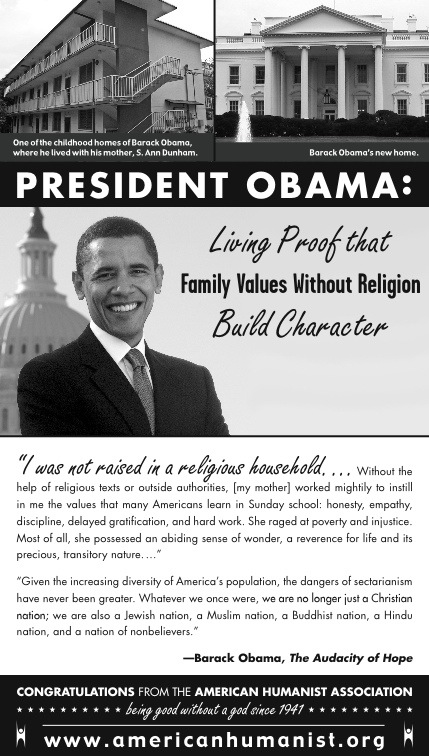Penmachine
21 January 2009
Obama, religion, and hard work ahead
I was driving to my oncologist appointment just after 9:00 a.m. yesterday when the Chief Justice of the U.S. Supreme Court inaugurated Barack Obama as President of the United States. I heard it on the radio, and I teared up a little. The oath of office itself was surprisingly short, and both Obama and the Justice stumbled a little with the words in their enthusiasm—it sounded refreshingly informal and real.
Almost a year ago, even before the economy started seriously tanking, I wrote about Obama, saying:
America and the rest of us need inspiration now. America's citizens need to say to us, and to themselves, "We have been on the wrong path, and we will choose a different and better way." To see and to listen to Barack Obama as president will demonstrate the beginning of that choice. If I'm right, I think he will win.
He did win. Yesterday he could celebrate and dance; today he has to start doing stuff. Web nerds like me see good signs in small things, like the new whitehouse.gov website, which is well designed, has a blog with RSS, uses valid code, and is search engine friendly. More importantly, he has already ordered a halt to military commission prosecutions at Guantánamo Bay. He meets his military advisors this afternoon to plan withdrawal of U.S. armed forces from Iraq.
His response to America's unusual religiosity (for a Western democracy) is also worth noting. President Obama was not involved with and did not endorse this ad in the Washington Post from the American Humanist Association (via PZ Myers), but I think it is a good sign:
The headline is "President Obama: Living proof that family values without religion build character," with supporting quotes from his bestseller The Audacity of Hope ("I was not raised in a religious household..."). Some people are gonna get steamed over this one, I'm sure, and use it to continue maligning the new President. But though he is a Christian now, Obama obviously knows the benefits of a secular state, and why his country's founders created America as such. He understands that the non-religious —like both his parents—can be good people and raise healthy children, like him, who make wise choices.
That he and his administration not only recognize, but celebrate the diversity of their country—and that, in his own carefully crafted words during the inaugural address, "our patchwork heritage is a strength, not a weakness"—is a strength in itself. He, like us, has seen in the past decade how parochial sectarianism can do vast harm around the world.
The man has enough good will from Americans, and many of the other few billion of us, that he need not work miracles immediately, but he also seems to know that he doesn't have too much time. He must work with the citizens who elected him to realign his country's domestic, foreign, energy, and environmental policies. He must translate his ability to inspire as a candidate into a mandate to inspire as the world's most powerful person. I think, and hope, that he is up to the task.
Labels: americas, government, politics, racism, religion
04 November 2008
President Obama
 Back in February, I wrote:
Back in February, I wrote:
America and the rest of us need inspiration now. America's citizens need to say to us, and to themselves, "We have been on the wrong path, and we will choose a different and better way." To see and to listen to Barack Obama as president will demonstrate the beginning of that choice. If I'm right, I think he will win.
And so it is. I'm glad I wasn't wrong. Thank you for your choice, citizens of the United States of America.
Still waiting on news about Proposition 8. Fingers crossed.
Labels: americas, government, politics
23 June 2008
Sayonara, "Search Engine"
A couple of months ago I noted that the Canadian Broadcasting Corporation has two technology-focused radio shows, "Spark" and "Search Engine," and that I couldn't always figure out how they were supposed to differ. (In the comments, Darren Barefoot noted that one way to tell is that "'Search Engine' almost always comes with a sense of righteous indignation, which gets a bit old after a while.")
It looks like CBC also wondered why they had both shows, and has now dissolved "Search Engine" as a radio show by having host Jesse Brown report on technology for other CBC Radio programs. This despite "Search Engine" being one of the network's most-downloaded podcasts. So there will still be a compilation podcast, and the blog will continue too.
That's not a bad solution. Of the two shows, I prefer Nora Young's lifestyle-focused "Spark" over Brown's more politically obsessed "Search Engine" anyway, and "Spark" is coming back in much the same form as before. "Search Engine" will be quite different, since Brown will be working on his own without a team of correspondents, producers, and researchers. We'll see how that goes.
It's worth listening to the last regular show of "Search Engine," however. In it, Brown interviews Canadian Industry Minister Jim Prentice about the lousy new Canadian copyright legislation currently before the House of Commons. Prentice doesn't come across well—but in this case, I think the righteous indignation is appropriate.
Labels: cbc, controversy, copyright, government, podcast, radio
07 February 2008
I think he'll take it
 I'm Canadian, and can't vote in the upcoming U.S. elections. But they affect me, as they affect everyone on the world, so I have opinions.
I'm Canadian, and can't vote in the upcoming U.S. elections. But they affect me, as they affect everyone on the world, so I have opinions.
I think—as most seem to—that John McCain or whoever wins the Republican nomination would have to work miracles to win the general election this time around. And I think that's a good thing. His party has damaged his country and its relations with the rest of us in the past seven years, and they do not deserve to keep running it. I hope its citizens agree.
On the Democrat side, there were a number of strong candidates, now down to Hillary Clinton and Barack Obama. As Larry Lessig notes in his video today, their policies do not differ especially radically (although Obama's policy document and website state without equivocation, "I will close Guantanamo," which is enough for me right there). I think either one would make a good president of their nation, and obviously make history doing it.
Where I agree with Lessig, and why I think Obama is a better choice, is that he is inspiring to watch and to listen to in the way no other presidential candidate is, from Clinton to Edwards to McCain and the rest. There is a danger with Obama, as Tom Negrino notes:
What bothers me the most about Obama is his core message, which boils down to "I'm magic, and I'll be able to bring everyone together to move America forward."
What I've seen of his policies seems more concrete to me, but it is true that many of his speeches are long on rhetoric and short on details.
Yet rhetoric is not evil if it not empty, if real action follows it. I think Obama can inspire a politics of "hope and common sense," rather than one of "fear and ideology," as he says. To lead the United States, he need not know the answer to every question—that's why presidents hire smart staffs—but he does need to listen, and to prompt action.
I think one reason he inspires so many already is that while he does give speeches crafted by a team of top-notch writers, he doesn't sound like a machine while he does it. He comes across as a human being. Clinton may be smarter, more knowledgeable, and more experienced, and I hope if Obama wins she can find a place to execute her ideas in his administration. (And if she wins, I certainly hope he can find one in hers.)
But she is not more inspiring. America and the rest of us need inspiration now. America's citizens need to say to us, and to themselves, "We have been on the wrong path, and we will choose a different and better way." To see and to listen to Barack Obama as president will demonstrate the beginning of that choice. If I'm right, I think he will win.
Labels: americas, government, war
31 January 2008
The looking glass

 Vancouver's Downtown Eastside is infamous worldwide. Even though it's home to thousands of people from all walks of life, most folks here and elsewhere know it for its poverty and widespread drug use.
Vancouver's Downtown Eastside is infamous worldwide. Even though it's home to thousands of people from all walks of life, most folks here and elsewhere know it for its poverty and widespread drug use.
When my mother was young, it was our city's main shopping and entertainment district. Her parents often visited for dinner and dancing. Even when I was a kid in the '70s, we went there all the time, to Woodward's, Army and Navy, Gastown, and elsewhere in the neighbourhood. Then, when Woodward's shut down in the early '90s, the area's gradual decline became an implosion.
But it's part of a much bigger picture. The Downtown Eastside is the symbol, but Greater Vancouver's poverty and addiction problems are widespread. There are hotspots of dealing in New Westminster, Surrey, and other places too. Beyond those, the consequences—illness and disease, property crime, street prostitution, violence, despair—are everywhere in my hometown, from the city centre to its most far-flung suburbs.
Yet this is still a delightful place, a wonderful one to live in, beautiful and clean and vibrant and diverse. How can that be?
I've never been an addict, nor poor, nor in danger from addiction or poverty, but I know people who have, some of them very close to me. When they are part of that world it is like they pass through the looking glass, into another realm, a parallel city that is here, beside the rest of us. Or inside, but largely divorced from the green transparent condo towers and the parks and the trendy shops and the well-maintained Vancouver Specials.
In that shadow city, people steal from friends and relatives for money to buy cocaine, booze, heroin, and meth. They and their associates get abused, beaten up, and threatened. They live in crappy apartments or basement suites or rooming houses or run-down hotels or on the street. Or in decent places they fear they could lose in an arbitrary moment. They hang out with gangsters, frequent places I'd rather not know about, flick lighters and burn lips, or tap needles and hunt for veins.
Those of us on the bright side of the glass encounter touches from the other side. Should we believe the rumours: are those 99-cent slices of pizza so cheap because the cheese is fenced by addicts stealing from supermarkets? Should we buy those steel screen doors because our houses have been burglarized and our CD collections stolen once too often? When we see that man or woman begging on the street, or sleeping in a wet mummy bag under the overpass, or standing in line on Welfare Wednesday, can we look them in the eye?
Closer to home, more bitterly, we see people we love, or want to keep loving, drift back and forth across the glass, sometimes healthy and engaged and employed, sometimes ill and disconnected and aimless. We can't tell which version is real, because they both are.
So Vancouver, like many other cities, is amazing and happy and prosperous, not just on the surface, but all the way through. Also all the way through are the other, hollow parts that might be hard to see, or simply hard to look at. The parts intertwine, they interlock, they form the social structure of our city. If you slip through the looking glass into the hollows, it can be hard to find the way back, even when the other side, and your old life, is right there.
I don't have a solution, or even an ending. Smarter people than me are working hard to try to figure things out. But maybe these things resist figuring, resist logic. We are all here, and there. We don't know which road, if any, leads out of the wood.
Labels: addiction, controversy, government, home, security, vancouver
30 December 2007
Torture
Several years ago, before the 2004 U.S. election, I wrote about Guantanamo Bay, still for me the key symbol of the failure of American foreign and legal policy after the 9/11 attacks, although I have been encouraged that the country's courts and media have at least done some chipping away at the edges of its black hole.
A big issue this year has been allegations of government-endorsed torture by U.S. government personnel at Guantanamo and elsewhere. I think P.Z. Myers's take on the subject today is cogent:
When the U.S. government announces [its] support for torture, they aren't talking about intelligence gathering: they are simply saying "Fear us." They are taking the first step on the road to tyranny.
The real problem is that fear isn't a good tool to use in a democratic society. [...] Anyone who supports torture is a traitor to the democratic form of government...
This upcoming year will give Americans a chance, once again, to decide what kind of country they want to become, and whether that will be a different one, with Guantanamo and torture as a sad past to remember, not a poisonous legacy for the future.
Iraq, well, that's more complicated, isn't it?
Labels: americas, government, terrorism, war
24 October 2007
Links of interest (2007-10-23):
- Speaking of the whole Dumbledore thing, here's a funny list: "Gay marriage will encourage people to be gay, in the same way that hanging around tall people will make you tall."
- "What is it about the world of enterprise software that routinely produces such inelegant user experiences?" One explanation: "'Enterprise software' is software that has to be sold to an 'enterprise', where someone who doesn't use the software (typically a manager) must be persuaded to use his purchasing authority to buy the software."
- Secrets that airlines don't want you to know (nothing too earth-shattering).
- 25 awesome action heroes.
- "Power users are a minority, and while they point the way to the future, they tend to be disappointed when the rest of the market catches up with an inferior product that has a lower barrier to new users."
- Gmail is finally getting IMAP support. If POP-only support frustrated you until now, you'll find that useful.
- "If it happened under Bush, Iran-Contra wouldn't even make Page A-18."
Labels: books, design, gmail, government, linksofinterest, movie, travel
10 October 2007
Greener future?
 British Columbia's Liberal provincial government (not renowned for its environmental record) recently sent out a tabloid-sized, four-page flyer to B.C. residents. We received ours today. The title is "What Choices Would You Make for a Greener Future?: Budget 2008 Consultation Paper" (here's the PDF).
British Columbia's Liberal provincial government (not renowned for its environmental record) recently sent out a tabloid-sized, four-page flyer to B.C. residents. We received ours today. The title is "What Choices Would You Make for a Greener Future?: Budget 2008 Consultation Paper" (here's the PDF).
In essence, it asks us where we think the government should spend money to reduce greenhouse gas emissions, encourage alternative power sources and transportation options, pay for healthcare costs, and provide adequate housing for our fellow citizens.
There is an online version of the questionnaire, which is handy. Overall, it's an interesting and encouraging idea. But before even reading the flyer, I flipped it over and read the fine print:
Normally I would think it wise—indeed expected—for governments to use paper with a reasonable proportion of recycled pulp in it, and 40% isn't bad. But for a flyer talking about a "greener future," using 100% post-consumer recycled paper is the only reasonable choice. I wouldn't care if it was brown or grey rather than stark white.
As it is, the 40% recycled content (or rather, the 60% non-recycled content) makes the whole publication and the process behind it look like lip service to environmental causes. Gillian also notes that there's a whole stack of the flyers in her building's recycling bin next to the mailboxes—a stack that certainly never got read.
While I'm filling out the online questionnaire, I will be wondering where my opinions will be registered, and whether they'll end up 60% watered down as well. It's too bad I ended up thinking so cynically.
Labels: environment, government, green, science

